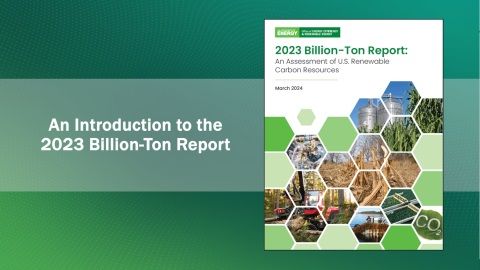DOE: New deep-dive video resources on the 2023 Billion-Ton Report now available

SOURCE: U.S. Department of Energy
December 6, 2024
BY U.S. Department of Energy
New deep-dive videos about the U.S. Department of Energy Bioenergy Technologies Office's (BETO's) 2023 Billion-Ton Report (BT23) are now available to help users access and apply the report findings and associated online data resources.
The BETO-funded BT23, developed by Oak Ridge National Laboratory (ORNL), is the latest in a series of comprehensive assessments examining the renewable carbon resources available in the United States. BT23 found that the U.S. has the potential to produce over 1 billion tons of sustainable biomass annually, with the possibility to triple bioenergy production and meet approximately 15% of the country’s future energy needs. These deep-dive videos break down the report’s key findings, exploring their significance to the economy, environment, and industry.
Advertisement
Advertisement
Stakeholders at every level—local, regional, and national—can use these new video resources to gain valuable insights into U.S. biomass potential. The detailed data provide insight to understand biomass production capacity, contributing to a strong bioeconomy and the development of sustainable, low-carbon energy solutions.
These videos, in addition to other easy-to-use tools to explore the nation’s bioenergy data, are available through the Bioenergy Knowledge Discovery Framework, or BioenergyKDF, data portal. The video playlist is also available on YouTube.
Advertisement
Advertisement
Available Video Resources:
- Introduction to the 2023 Billion-Ton Report ORNL’s Matthew Langholtz provides a summary of the BT23 findings.
- What’s in the 2023 Billion-Ton Report? ORNL’s Matthew Langholtz provides a short background summary for each of the resource classes and market scenarios explored in the BT23 report.
- BioenergyKDF: How to Access the Data ORNL’s Maggie Davis shares how to access the resources from BT23 using the Bioenergy KDF data portal.
- Interpreting Results of the 2023 Billion-Ton Report ORNL's Matthew Langholtz gives an in-depth look at the results of BT23 report.
- 2023 Billion-Ton Report: Macroalgae DOE contractor Anne Otwell explores the role of macroalgae in the bioeconomy.
Learn more about the BioenergyKDF, the nation’s most comprehensive source of data for bioenergy, providing equitable access to information in support of a data-driven, prosperous U.S. bioeconomy.
Related Stories
The U.S. EPA on July 8 hosted virtual public hearing to gather input on the agency’s recently released proposed rule to set 2026 and 2027 RFS RVOs. Members of the biofuel industry were among those to offer testimony during the event.
The USDA’s Risk Management Agency is implementing multiple changes to the Camelina pilot insurance program for the 2026 and succeeding crop years. The changes will expand coverage options and provide greater flexibility for producers.
President Trump on July 4 signed the “One Big Beautiful Bill Act.” The legislation extends and updates the 45Z credit and revives a tax credit benefiting small biodiesel producers but repeals several other bioenergy-related tax incentives.
CARB on June 27 announced amendments to the state’s LCFS regulations will take effect beginning on July 1. The amended regulations were approved by the agency in November 2024, but implementation was delayed due to regulatory clarity issues.
The USDA’s National Agricultural Statistics Service on June 30 released its annual Acreage report, estimating that 83.4 million acres of soybeans have been planted in the U.S. this year, down 4% when compared to 2024.
Upcoming Events










